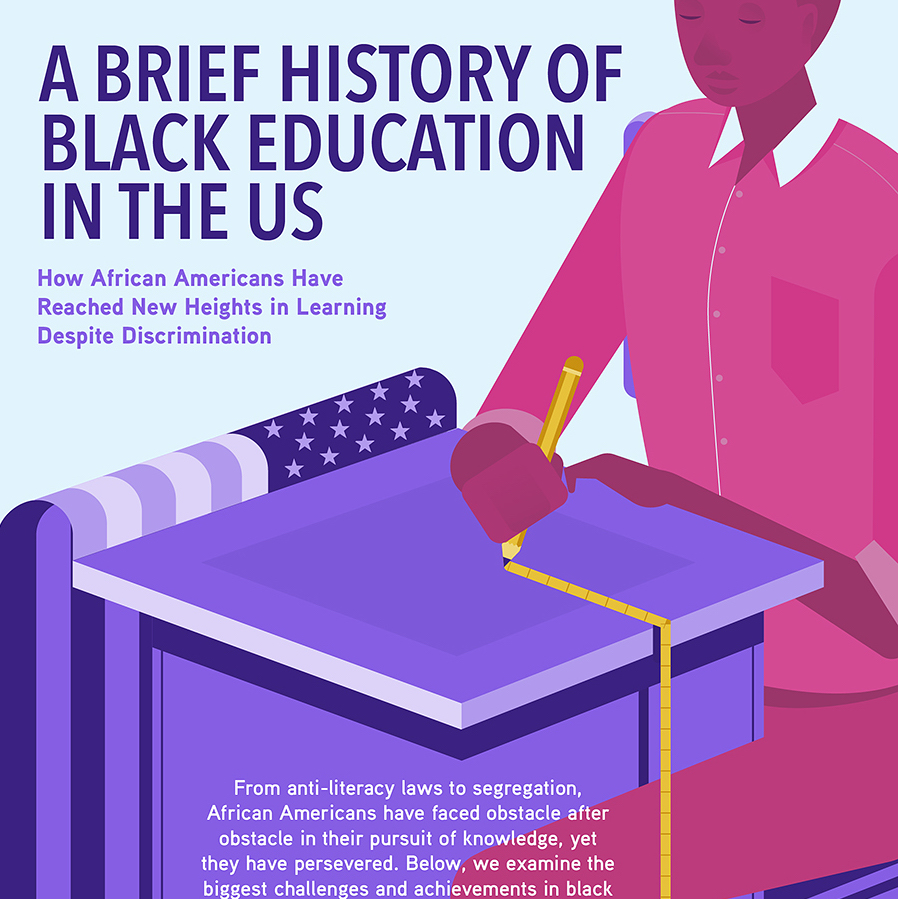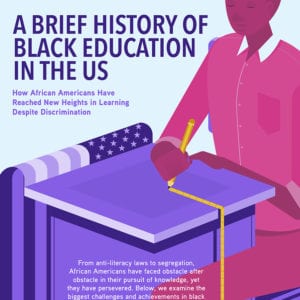A Brief History of Black Education in the US

Find your degree
A Brief History of Black Education in the US
How African Americans Have Reached New Heights in Learning Despite Discrimination
From anti-literacy laws to segregation, African Americans have faced obstacle after obstacle in their pursuit of knowledge, yet they have persevered. Below, we examine the biggest challenges and achievements in black education in the United States.
Pre-Colonial Africa (Up to 1400s) (1)
Africa was — and remains — a continent of diverse peoples with educational traditions that precede the arrival of European missionaries and their Christian schools in the late 15th century. Generally speaking, pre-colonial African education relied on the tradition of orally sharing knowledge and skills from generation to generation, with the goal of improving society through the cultivation of its individual members. (2)
1. https://www.oxfordbibliographies.com/view/document/obo-9780199846733/obo-9780199846733-0073.xml
2. https://files.eric.ed.gov/fulltext/EJ1079287.pdf
Slavery (1500s to 1865) (3)
3. https://wol.iza.org/uploads/articles/122/pdfs/slavery-racial-inequality-and-education.pdf
Slave Trade from Africa to the US, 1501–1866 (4)
4. http://www.slavevoyages.org/estimates/11bWXwVk
From its introduction in the 16th century to its abolition with the US Civil War in 1865, slavery held African-born people and their descendants in bondage. States supportive of slavery used anti-literacy laws as a strategy to dehumanize and control the enslaved black population by making it illegal for them to learn to read and write. Despite these restrictions, slaves continued to both teach and learn through storytelling, song, and Bible study. (5)
Anti-Literacy Laws (5,6)
| Year Passed | State |
| 1740 | South Carolina |
| 1819 | Virginia |
| 1833 | Alabama |
5. https://www.thirteen.org/wnet/slavery/experience/education/history2.html
5. https://www.thirteen.org/wnet/slavery/experience/education/docs1.html
5. https://www.thirteen.org/wnet/slavery/experience/education/docs1.html
6. https://americanexperience.si.edu/wp-content/uploads/2014/09/Literacy-as-Freedom.pdf
Segregation (1896 to 1954) (7)
Federally accepted by the Supreme Court with Plessy v. Ferguson in 1896, segregation extended to all facets of life, including education. So-called “Jim Crow schools” for African Americans only taught the skills necessary for agricultural work and domestic service, but the students yet prevailed.
Literacy Rates
| Year | African Americans | White Americans |
| 1890 | 40% | 70% |
| 1930 | 80% | 90% |
7. https://www.aft.org/periodical/american-educator/summer-2004/jim-crows-schools
Busing (1954 to 1990s) (8)
Stemming from the Supreme Court decision on Brown v. Board of Education in 1954, desegregation busing was an attempt by the federal government to racially integrate education by transporting primarily African American students to schools outside of their neighborhoods. While often criticized, busing did, in fact, integrate schools to levels unseen since its abandonment in the early 1990s.
Black Students at Majority White Schools
| Year | Percent |
| 1954 | 0 |
| 1960 | 0.1 |
| 1964 | 2.3 |
| 1967 | 13.9 |
| 1968 | 23.4 |
| 1970 | 33.1 |
| 1972 | 36.4 |
| 1976 | 37.6 |
| 1980 | 37.1 |
| 1986 | 42.9 |
| 1988 | 43.5 |
| 1991 | 39.2 |
| 1994 | 36.6 |
| 1996 | 34.7 |
| 1998 | 32.7 |
| 2000 | 31.0 |
| 2001 | 30.2 |
| 2006 | 27.7 |
| 2011 | 23.2 |
Historically Black Colleges and Universities (HBCUs)
(1837 to Today) (9)
Prior to the Civil War, it was nearly impossible for African Americans to pursue higher education. In response, Cheyney University was founded specifically to instruct black students in 1837.
101: The number of HBCUs in the US today
Nearly 300,000 students are educated at HBCUs each year
Today, there are many HBCU online degree programs, making it easier than ever to pursue a college degree,
Enrollment at Historically Black Colleges and Universities (10, 2)
| Year | Enrollment |
| 1980 | 234,000 |
| 1990 | 257,000 |
| 2000 | 276,000 |
| 2010 | 327,000 |
| 2015 | 293,000 |
| 2017 | 298,000 |
9. https://cheyney.edu/who-we-are/
2. https://nces.ed.gov/fastfacts/display.asp?id=667
SOURCES


